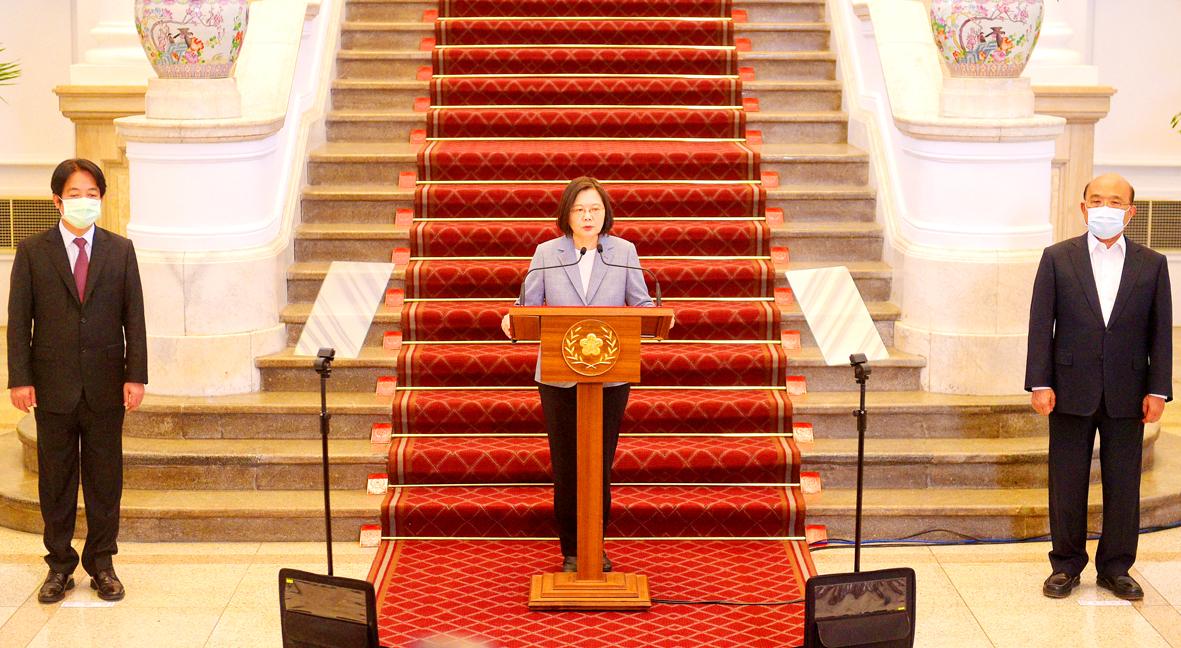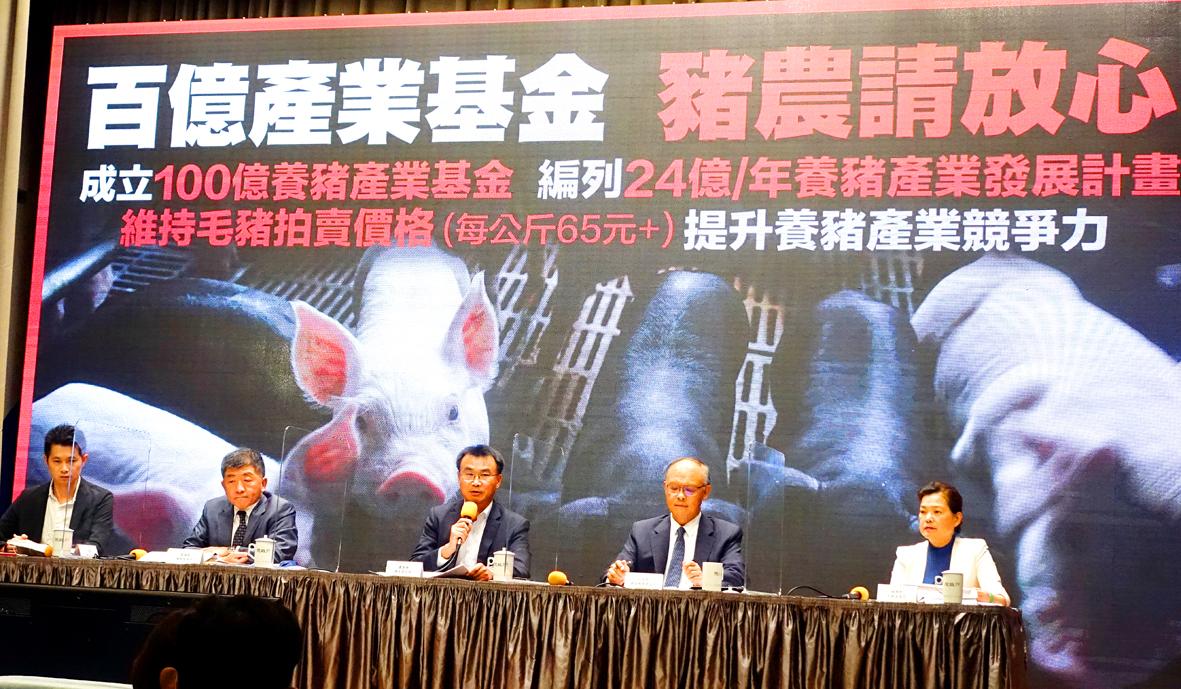President Tsai Ing-wen (蔡英文) yesterday announced that Taiwan would ease restrictions on US beef and pork imports, while setting standards for pork containing ractopamine, in an apparent attempt to broker a trade deal with the US.
“This is a decision that was made based on national economic interests and is in line with future comprehensive strategic objectives,” Tsai told a news conference at the Presidential Office in Taipei.
Despite her Democratic Progressive Party’s long insistence on a “zero tolerance” policy toward ractopamine, Tsai said she has instructed government agencies to set a “safe tolerance” level for the leanness-enhancing drug in imported pork, based on scientific evidence and international standards, on the condition that the public’s health is protected.

Photo: Chang Chia-ming, Taipei Times
Later yesterday at a news conference at the Executive Yuan, officials said the policy, scheduled to take effect on Jan. 1, would have a limited effect on consumers and the nation’s pig farming industry.
The decision to lift the bans on US pork containing ractopamine and beef from cattle more than 30 months old is aimed at facilitating efforts to expand Taiwan’s international trade, officials said.
Matching international standards and deepening trade ties have been central to the nation’s economic strategies, and the nation’s economic success can be attributed to it complying with international trade practices and regulations, Minister Without Portfolio John Deng (鄧振中) said.

Photo: Wang Yi-sung, Taipei Times
Washington has for nearly a decade criticized Taipei as an “unreliable trade partner,” because it had failed to set a legal standard for the amount of ractopamine permitted in pork imported from the US, which has hampered US pork exports to the nation, he said.
On whether lifting the ban would lead to concrete economic progress — such as the signing of the Taiwan-US Trade and Investment Framework Agreement — Deng said Washington is not looking for a quid pro quo exchange, but is seeking to remove trade obstacles.
The US views Taiwan as an important trade partner, and he believed the US would soon take action to bolster bilateral ties, he added.
More nations have in the past few years allowed the import of meat products, including Japan and South Korea, who are Taiwan’s main trade competitors, and nine other member states of the Comprehensive and Progressive Agreement for Trans-Pacific Partnership, Minister of Economic Affairs Wang Mei-hua (王美花) said.
Without lifting the ractopamine ban, the nation would be unable to make progress on free trade agreements and regional economic integration deals, she said.
Council of Agriculture Minister Chen Chi-chung (陳吉仲) said that Taiwanese consume about 900,000 tonnes of pork each year, 91 percent of which is locally produced, while US pork accounts for about 1 percent.
Only about 20 percent of pig farmers in the US still use ractopamine, he said, adding that Taiwanese can always not buy US pork.
The new policy would not have a significant effect on the nation’s eating habits or hog industry, he said.
Minister of Health and Welfare Chen Shih-chung (陳時中) said the ministry yesterday finalized a rule that would require the country of origin of individually packaged pork products and pork sold at restaurants to be clearly labeled.
Vendors who do not label the origin of their pork products could face a fine of up to NT$3 million (US$101,622), and those who use false labels could be fined up to NT$4 million, he said.
The Food and Drug Administration would use the Codex Alimentarius Commission’s maximum ractopamine residue limit of 10 parts per billion in pork and beef as a reference, and set a maximum permissible value in imported US pork that reflects the eating habits of Taiwanese, he said.
The government’s commitment to safeguarding public health would not be affected by the lifting of the import ban, he added.
The American Chamber of Commerce in Taipei yesterday in a statement welcomed the decision, saying it would help Taiwan and the US to make progress in starting negotiations for a bilateral trade agreement.
Additional reporting by CNA and Kao Shih-ching

CHAOS: Iranians took to the streets playing celebratory music after reports of Khamenei’s death on Saturday, while mourners also gathered in Tehran yesterday Iranian Supreme Leader Ayatollah Ali Khamenei was killed in a major attack on Iran launched by Israel and the US, throwing the future of the Islamic republic into doubt and raising the risk of regional instability. Iranian state television and the state-run IRNA news agency announced the 86-year-old’s death early yesterday. US President Donald Trump said it gave Iranians their “greatest chance” to “take back” their country. The announcements came after a joint US and Israeli aerial bombardment that targeted Iranian military and governmental sites. Trump said the “heavy and pinpoint bombing” would continue through the week or as long

TRUST: The KMT said it respected the US’ timing and considerations, and hoped it would continue to honor its commitments to helping Taiwan bolster its defenses and deterrence US President Donald Trump is delaying a multibillion-dollar arms sale to Taiwan to ensure his visit to Beijing is successful, a New York Times report said. The weapons sales package has stalled in the US Department of State, the report said, citing US officials it did not identify. The White House has told agencies not to push forward ahead of Trump’s meeting with Chinese President Xi Jinping (習近平), it said. The two last month held a phone call to discuss trade and geopolitical flashpoints ahead of the summit. Xi raised the Taiwan issue and urged the US to handle arms sales to

State-run CPC Corp, Taiwan (CPC, 台灣中油) yesterday said that it had confirmed on Saturday night with its liquefied natural gas (LNG) and crude oil suppliers that shipments are proceeding as scheduled and that domestic supplies remain unaffected. The CPC yesterday announced the gasoline and diesel prices will rise by NT$0.2 and NT$0.4 per liter, respectively, starting Monday, citing Middle East tensions and blizzards in the eastern United States. CPC also iterated it has been reducing the proportion of crude oil imports from the Middle East and diversifying its supply sources in the past few years in response to geopolitical risks, expanding

An Emirates flight from Dubai arrived at Taiwan Taoyuan International Airport yesterday afternoon, the first service of the airline since the US and Israel launched strikes against Iran on Saturday. Flight EK366 took off from the United Arab Emirates (UAE) at 3:51am yesterday and landed at 4:02pm before taxiing to the airport’s D6 gate at Terminal 2 at 4:08pm, data from the airport and FlightAware, a global flight tracking site, showed. Of the 501 passengers on the flight, 275 were Taiwanese, including 96 group tour travelers, the data showed. Tourism Administration Deputy Director-General Huang He-ting (黃荷婷) greeted Taiwanese passengers at the airport and